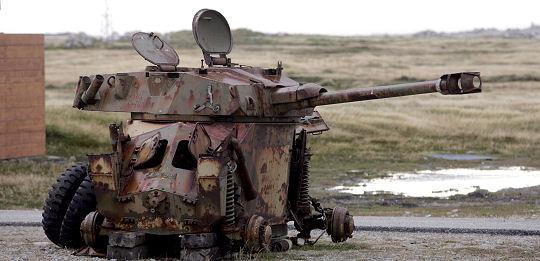5 Minute Guide: The Falklands
Updated on 01 February 2010
When the Argentine flag was raised on the Falkland Islands in 1982 a short but bloody war was sparked that saw 253 British and 750 Argentinean soldiers killed.

What happened?
They're a small, thinly populated group of islands in the South Atlantic, known to Britons as the Falkland Islands, and to the Argentinians as Las Malvinas.
Two-thirds the size of Wales, it a British overseas territory, with most of the 3000 Falklanders speaking English and having strong ties to Britain.
The British had a small settlement there from 1766. When it was abandoned in 1774, the territory became part of Argentina.
Then in 1883, the British seized the islands by force. They have been a remote imperial outpost ever since, but Argentina always maintained its claim.
The uncertainty blighted the island's economy, and the British even discussed handing them over in 1980, but the plan foundered on local opposition.
Why did it happen?
By 1982, the political climate in both London and Buenos Aires had become serious.
The military dictator of Argentina, General Galtieri, was facing an economic crisis at home. Meanwhile in the United Kingdom, Margaret Thatcher had become one of the most unpopular prime ministers in British history.
A greater number of veterans have died by their own hands since the war finished.
The spark that lit the tinderbox of the Falklands was a strange incident on South Georgia, another British island in the South Atlantic claimed by Argentina. A group of salvage workers raised an Argentine flag, sparking a diplomatic row.
This spurred Argentina to bring forward its existing plans for an invasion, and they moved in to occupy the Falklands by force on 2 April.
The Argentine ruling junta was hoping that Britain would try to reclaim the islands, but they were surprised by both the strength of the international community's condemnation, and Britain's military response.
Though Britain's armed forces were much stronger than Argentina's, it would be a massive logistical operation to fight a war 8,000 miles from Britain, with no help from other South American nations likely to be forthcoming.
But a task force assembled at Ascension Island, another tiny British territory nearly half-way to the Falklands, and an invasion began. The wreckage of an Argentine armoured car destroyed during the war.
The wreckage of an Argentine armoured car destroyed during the war.
There were considerable diplomatic negotiations for a ceasefire between the two countries, but these effectively came to a halt with the sinking of the Argentine flagship ARA General Belgrano on May 2, by a British submarine.
On May 21, British troops made their first amphibious landing at San Carlos water, the other side of East Falkland from the capital, Stanley.
British shipping suffered significant losses from Argentinian aircraft, including the Destroyer HMS Sheffield and the RFA Sir Galahad.
British shipping suffered significant losses from Argentinian aircraft, including the Destroyer HMS Sheffield and the RFA Sir Galahad and Sir Tristram. The loss of the transport ship MV Atlantic Conveyor deprived the British forces of most of their helicopters, forcing them to attack Stanley on foot.
But after some tough fighting on the hills west of Stanley, they were able to enter the town itself without much opposition. The Argentine troops on Falkland surrendered on June 14th.
The Argentinians lost 750 men in the conflict, while the British lost 253 - and a greater number of veterans have died by their own hands since the war finished. The cost has been estimated at over £2m per islander.
What happens next?
The Falklands remains a British territory, and British troops are still based there. But Argentina continues to claim the islands: a fact which puts a continued strain on relations between the two countries.
Since the war, the Falkland Islands economy has improved considerably, largely on the back of the squid fishing industry, and increasing tourism. There is also the possibility of large oil deposits in the area.
Key players
General Galtieri
A career soldier, he was an enthusiastic supporter of the military coup which took power in Argentina in 1976, against a background of serious economic decline.
He became president himself in 1981, in another coup. His personal popularity falling, he ordered the invasion of the Falklands in 1982 - and was removed from power shortly after the surrender.
Margaret Thatcher
Also struggling against bad poll ratings in 1982, she insisted on a swift re-invasion of the Falklands, and rejected diplomatic compromises. The successful operation produced a massive upswing in her popularity.
This played a factor in the Conservatives' landslide election victory in 1983, providing a base for the reforms of the British economy which she enacted over the next seven years.
Major General Jeremy Moore
He was the commander of the British Land Forces, who took the surrender of the Falklands from the Argentine military governor, General Mario Menendez.
The Falklands was the largest action to be commanded by a Royal Marine since the invasion of Madagascar in 1942. Maj-Gen. Moore was knighted in 1982, and retired from the Marines the following year.





